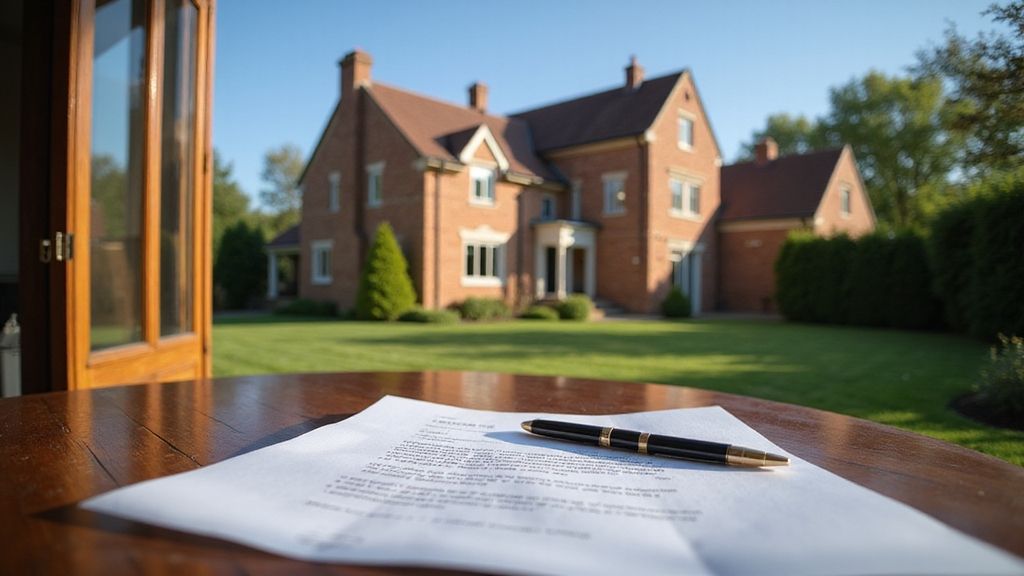Can I Sell My House to My LLC and Rent It Back?

Managing property while running a business often creates financial strain and complex tax situations. Many property owners struggle to balance their personal assets with business growth, leading to cash flow problems and missed opportunities.
Real estate decisions become more challenging when you’re trying to maintain both residential and commercial interests. You might feel stuck between keeping your home and expanding your business operations.
Tax burdens and property management responsibilities can overwhelm your financial planning. Meanwhile, traditional financing options may not provide the flexibility you need.
Yes, you can sell your house to your LLC and rent it back through a sale-leaseback arrangement. This strategy offers tax advantages, business asset growth, and personal living stability.
When structured correctly, it creates a win-win situation for both personal and business finances. This guide will show you how to execute a successful sale-leaseback transaction while avoiding common legal and tax pitfalls.
Key Takeaways
- You can sell your house to your LLC and lease it back, converting equity into cash while maintaining residence.
- Ensure the sale is at fair market value to comply with IRS guidelines and avoid potential legal issues.
- Legal documents such as a sales agreement and a properly recorded deed are required to transfer ownership to the LLC.
- This arrangement allows you to deduct rental payments on your tax return and the LLC to claim depreciation.
- Consult with legal and tax professionals to navigate the complexities and ensure compliance with all regulations.
What Is a Sale-Leaseback Arrangement?

A sale-leaseback arrangement is a financial deal where you sell your property and rent it back. You can sell your house to an LLC while continuing to live there as a tenant. This strategy helps you turn your home equity into immediate cash. If you choose this option, you might reduce your taxable income through rental payments.
The LLC benefits from this deal by adding a valuable asset to its portfolio. It also creates a steady income stream through your monthly rent payments. You must set fair market rental rates to meet tax requirements. While this setup works well, proper documentation of all transactions is essential.
So, both parties need to maintain clear records of the agreement terms. This approach can strengthen your financial position and the LLC’s business health.
Can You Legally Sell Your House to Your Own LLC?
You can legally transfer your house to your LLC if you follow specific legal requirements. This process requires a proper sale at fair market value to meet IRS guidelines.
We recommend creating a detailed sales agreement between you and your LLC. The deed must be officially recorded with your LLC as the new property owner.
You will gain access to various tax deductions for business expenses after the transfer. If you sell to an LLC, you might lose personal tax benefits like capital gains exclusion.
This transfer could affect your mortgage terms and property insurance coverage. When you complete the sale, your LLC becomes responsible for property maintenance and taxes.
Legal experts should review the transaction to ensure compliance with state laws. You might want to explore leaseback arrangements to continue living in the property.
So, while selling to your LLC is legal, careful planning prevents future complications. Since tax implications are complex, professional guidance helps make informed decisions.
How Does Selling Your House to Your LLC Work?

The process of selling your house to your LLC requires careful planning and documentation. You must first create a detailed sales contract with clear terms and conditions.
The sale price should match the current market value to meet IRS requirements. Your house will become a business asset once the LLC takes ownership.
This change allows you to claim tax deductions on property expenses and maintenance costs. If you want to stay in the house, you can set up a rental agreement.
We recommend speaking with tax experts before starting this process. You will need proper documentation to show this is a legitimate business transaction.
The rental payments won’t count as personal income for single-member LLC owners. So, legal guidance helps ensure compliance with all property transfer regulations.
If you structure the deal correctly, you can maintain both ownership and living rights. This arrangement offers tax benefits while protecting your personal assets.
What Are the Tax Implications of Selling to Your LLC?
Tax implications arise when you sell your house to your LLC. You must understand several tax rules to make informed decisions. If you transfer property to an LLC, capital gains taxes may apply.
Since single-member LLCs are disregarded entities, tax reporting becomes straightforward. You will report any rental income through your personal tax return. This arrangement affects how you can claim rent-related deductions.
Your property taxes might increase after the local tax office reassesses the value. When you sell to your LLC, you could lose the $500,000 tax exclusion benefit. If you have lived in the house for two years, different rules may apply.
While LLCs offer business advantages, they can create tax complications. We recommend speaking with a tax professional before making this decision. Tax experts will help you comply with IRS regulations correctly.
What Are the Potential Benefits of This Strategy?

This strategy offers multiple advantages that extend beyond basic tax benefits. You can deduct various expenses when transferring your house to an LLC. The key deductions include property taxes and mortgage interest payments.
If you manage the transfer correctly, you can claim depreciation on the property. Your LLC will receive steady income through the rental arrangement.
This setup helps create a clear separation between personal and business finances. When you own multiple properties, an LLC makes asset management easier. You will gain valuable protection for your personal assets from business risks. The legal structure shields your personal wealth if business problems arise.
Since the LLC becomes a separate entity, it can build its own credit history. We recommend consulting a tax professional before implementing this strategy.
If market conditions change, you can adjust rental terms through the LLC structure. While maintaining personal use, you will benefit from business tax advantages.
What Are the Risks and Downsides?
Risks and downsides can significantly impact your decision to sell a house to an LLC. You should consider several important drawbacks before proceeding with the sale.
1. Capital Gains Taxes:
The sale of your property to an LLC will trigger immediate tax obligations. If your property value increases, you must pay capital gains taxes. This situation could lead to unexpected financial burdens.
2. Loss of Homestead Exemptions:
Your property tax benefits will change after transferring ownership to an LLC. When you lose homestead exemptions, your property taxes might increase substantially. This change could affect your long-term financial planning.
3. Financing Complications:
Lenders typically require personal guarantees for LLC property loans. If your LLC faces financial problems, you might become personally liable. You could find it harder to secure loans through traditional banking channels.
If you decide to proceed, you must weigh these risks against potential benefits. While an LLC offers protection, the financial implications can be significant.
How Does This Compare to Selling Your House for Cash?
A cash sale differs significantly from selling your house to an LLC in several ways. You will receive immediate payment when choosing a traditional cash sale transaction.
The LLC route transforms your personal property into a business asset instead. This business structure offers potential tax advantages and simplified financial reporting.
You can rent back your property if you sell it to your LLC. If you choose an LLC sale, you must follow strict IRS rules.
The LLC option lets you deduct business expenses like maintenance and property taxes. Cash buyers typically want to close quickly without ongoing relationships.
While cash sales are straightforward, LLC transfers require more legal paperwork. So it’s essential to work with tax and legal experts for LLC property transfers.
This decision depends on your long-term financial and property management goals. If you need quick money, a cash sale might be your better option.
What Is the Process of Selling Your House As-Is?
Selling a house as-is means you sell the property without making any repairs or changes. You need to follow three main steps in this process:
1. Determine Fair Market Value
This step requires a professional assessment of your property’s current condition. You should gather recent sales data from similar properties in your area. If you price it too high, your house might stay on the market longer.
2. Draft a Clear Sales Agreement
The contract must state clearly that you won’t make any improvements. You and the buyer should agree on specific terms about the property’s condition. If any disputes arise later, this document will protect both parties.
3. Disclose Known Defects
The law requires you to tell buyers about existing problems with your house. We recommend listing all known issues in a disclosure document. When buyers know what to expect, they can make informed decisions.
Who Should Consider the LLC Sale-Leaseback Option?
LLC sale-leaseback options work best for specific types of property owners and business situations. You can benefit from this option if you want to turn your home into rental property.
This arrangement helps business owners protect their personal assets from company-related risks. If you need quick access to property equity, selling to your LLC offers a practical solution.
Business owners can convert personal costs into business expenses through this structure. You will find tax advantages while keeping control of your residential property.
When facing mortgage challenges, this option lets you stay in your home. We recommend this approach for entrepreneurs who want better financial organization. This strategy works well for people seeking both asset protection and tax benefits.
What Legal Documents Do You Need?
Legal documents protect both parties when selling a house to your LLC. The process requires specific paperwork to make the transaction valid and legal.
You will need three main documents to complete this transfer properly:
A sales agreement establishes the basic terms between you and your LLC. This contract must include the final sale price and any special conditions for the deal.
We recommend choosing either a warranty deed or quitclaim deed for property transfer. You should have this document notarized before filing it with your local county office.
Your LLC operating agreement needs updates to show the new property ownership. This document will outline how the property should be managed within the company structure.
If you prepare these documents correctly, you can avoid future legal complications. Since mortgage companies check these papers carefully, accuracy is essential.
When drafting these documents, you should consult with a legal professional. While some forms are standard, each situation might need specific adjustments.
How to Ensure the Transaction Is Done Properly?
A proper transaction requires several steps to protect all parties involved legally and financially. You must create a detailed sales contract that shows all sale terms.
The agreement should state the fair market value to meet IRS rules. It is essential to inform your mortgage lender about this sale immediately.
You should check if your mortgage has any due-on-sale rules. We recommend filing a transfer deed at your local county office.
If you follow legal requirements, the property transfer will happen smoothly.
Your business records must show the property as a company asset. So, keep track of all expenses related to the property transfer.
You need to save these records for future tax purposes. When in doubt, seek help from tax and legal experts. This will ensure your transaction follows state and federal laws.
Sell Your House Fast and Hassle-Free with Pezon Properties
Selling your house to an LLC and renting it back is a practical financial strategy. You must follow specific legal rules and tax guidelines. This process requires fair market value pricing and proper documentation.
We buy houses for cash in these locations:
- We buy houses in Wilkes-Barre
- We buy houses in Williamsport
- We buy houses in Wind Gap
- We buy houses in York
- We buy houses in York Township
Pezon Properties can help you with this house-to-LLC transaction process today. We are professional cash home buyers with years of experience.
Our team will guide you through every step of the sale process. You can contact us at Pezon Properties for a free consultation. If you want to sell your house quickly, we will make a fair cash offer.
Give us a call anytime at 484-484-0971 or fill out this quick form to get started today!
Get A Fair Cash Offer On Your House

About the author
Mathew Pezon
Mathew Pezon is the founder and CEO of Pezon Properties, a cash home buying company located in Lehigh Valley, Pennsylvania. With several years of experience in the real estate industry, Mathew has become a specialist in helping homeowners sell their properties quickly and efficiently. He takes pride in providing a hassle-free, transparent, and fair home buying experience to his clients. Mathew is also an active member of his local community and is passionate about giving back. Through his company, he has contributed to various charities and causes.















